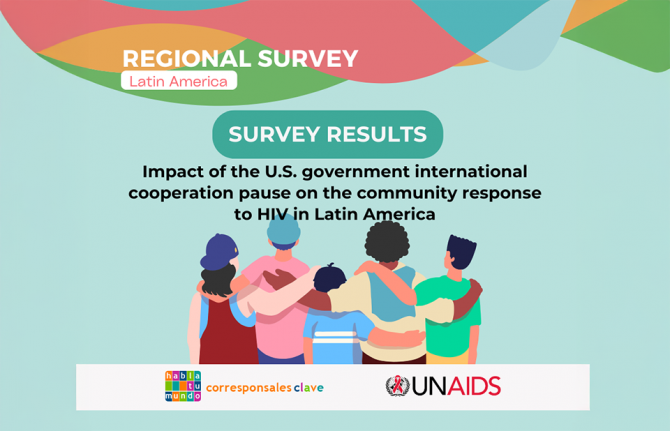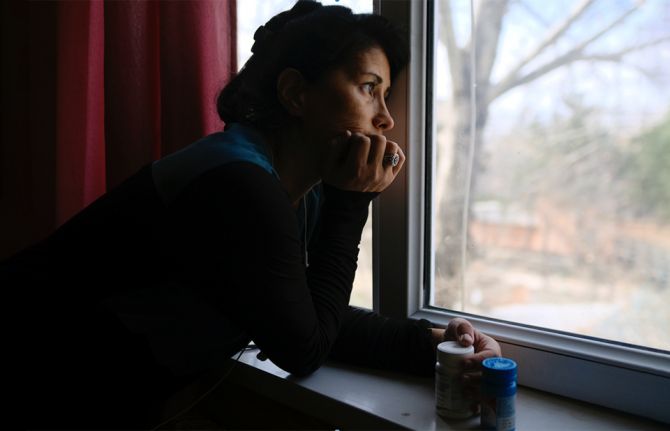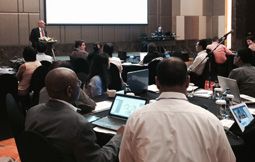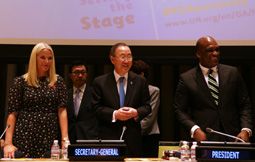
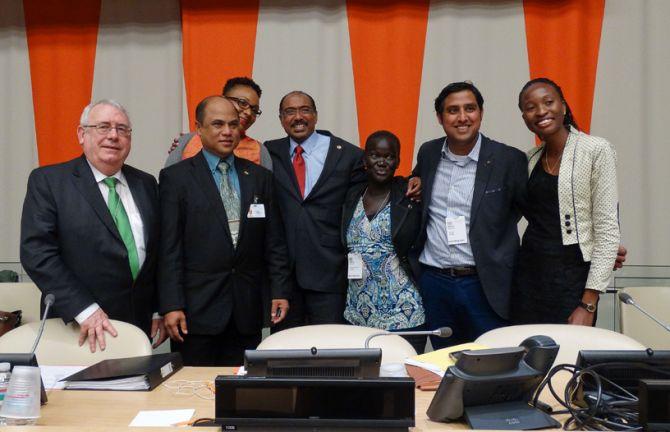
Panelist H.E. Joe Costello, Minister of Trade and Development of Ireland; Chair H.E. Ismanto Adna, Minister of Sport and Youth Affairs, Republic of Suriname; Panelist Ms. Amina Doherty, International Consultant and Board Member of the Global Fund for Women and Just Associates (Civil Society Representative of Women’s Networks); UNAIDS Executive Director Michel Sidibé; Discussant Ms Jacquelyn Alesi Programme Director, Uganda Network for Young People Living with HIV; Moderator Mr Rajiv Joshi, Interim CEO, The B Team and Co-Chair, UN Working Group at Beyond 2015; and Panelist Ms Primrose Nanchani Manyalo, Programme Coordinator, Restless Development, Zimbabwe (Major Group on Children and Youth Civil Society Representative).
Debrief
Better development outcomes through participation: The role of women, the young people and civil society in the post-2015 debate
10 March 2014
10 March 2014 10 March 2014The Contributions of women, the young and civil society to the post-2015 development agenda were discussed from 6-7 March at a consultation chaired by the President of the United Nations General Assembly John W. Ashe.
The two-day meeting is part of a number of high-level consultations and thematic debates that will take place at the General Assembly during the spring of 2014 to identify concrete action for the implementation of the post-2015 development agenda.
Key questions addressed included: How to reflect the rights of women and the young and civil society in the post-2015 development agenda? How to ensure people’s active, full and meaningful engagement in the design, elaboration and subsequent implementation of the post-2015 development agenda? And how to effectively support efforts, at all levels, to reduce inequality and discrimination?
Participants
World leaders, UN heads of agencies including UNAIDS Executive Director Michel Sidibé and civil society representatives including Jacquelyne Alesi, Programmes Director Ugandan Network of Young people living with HIV/AIDS.
Key messages
- UN and governments to ensure substantive space for young people, marginalized groups and civil society in the intergovernmental negotiating process that will result in the post 2015 agenda.
- Significant new resources should be made available for civil society including women’s and youth organizations, as part of the post-2015 agenda to enable civil society organizations to act independently and demand action from states on the community’s agendas.
- Draw lessons from the global AIDS response progress reporting as an inclusive accountability mechanism to monitor progress towards the implementation of the post-2015 development agenda.
Quotes
“I urge you to make the voices of young women heard in the post-2015 agenda and to assure access to safe, comprehensive sexual and reproductive health services delivered by knowledgeable, ethical, supportive, and qualified health service providers. For everyone; young, old, woman, man, HIV negative or HIV positive - we should include sexual and reproductive health and rights for all people in our goals for 2030.”
“Putting people at the center of governance mechanisms should be the guiding principle of any future architecture, especially with a view to enhancing global accountability. This must include a real transfer of decision-making power and influence from those who govern to the governed.”
Related
 “Who will protect our young people?”
“Who will protect our young people?”

02 June 2025

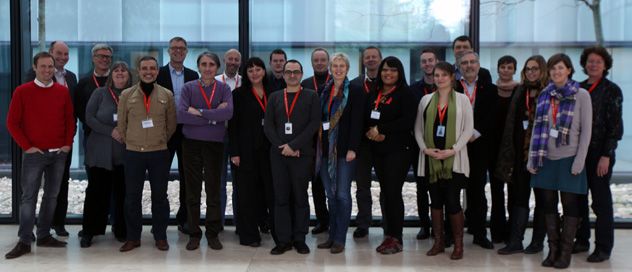
Participants included experts from the European Commission and European Union institutions, as well as representatives from key populations, service providers, research organizations, governments and the United Nations.
Debrief
Changing the game in Europe
28 January 2014
28 January 2014 28 January 2014In Europe, HIV prevalence is increasing in key populations at higher risk, especially among men who have sex with men and in Eastern Europe among drug users and their sexual partners.
In order to find ways to move towards zero new HIV infections, zero discrimination and zero AIDS-related deaths in Europe, UNAIDS organized a consultation last week at its headquarters in Geneva, Switzerland.
Participants
Experts from the European Commission and European Union institutions, as well as representatives from key populations, service providers, research organizations, governments and the United Nations took part in the meeting.
Key messages
- In many European countries strategic information on key populations remains limited.
- Stigma, discrimination, criminalisation of HIV transmission and a lack of services and incentives are often barriers to research.
- A new wave of HIV infections among MSM primarily affecting men in rural areas, smaller cities and countries in the east with historically low prevalence may be associated with the wider access to new technologies.
- New technologies are providing men with more opportunities to engage in same-sex encounters; Sex workers are also increasingly operating online and the internet market for new synthetic injectable drugs is rapidly evolving.
- At the same time new information technologies also bring opportunities for research, peer outreach and interaction, and are breeding a new generation of activism and community mobilisation which can radically change the game of the HIV response in Europe.
Quotes
“The internet and social media revolution is radically transforming the landscape for the HIV response in Europe and beyond”
“We need to stand by key populations affected by HIV, and defend their rights, whether it is in Athens, Abuja or Stockholm. We cannot leave people behind”
Related

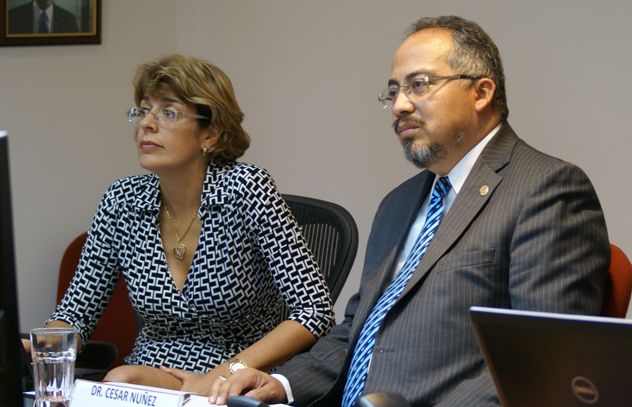
Andrea Boccardi, Senior Regional Adviser Strategic Interventions and César Antonio Núñez, Director, Regional Support Team for Latin America, UNAIDS participating at the consultation.
Debrief
Prioritizing people’s right to health and development post-2015
12 December 2013
12 December 2013 12 December 2013AIDS and other health conditions go beyond the bio-medical field and should be addressed from a human rights perspective. This was the main message which emerged from the Latin America regional dialogue held on 4 December in Panama City. The event was part of the series of consultations organized by the UNAIDS and Lancet Commission: Defeating AIDS - Advancing global health to gather perspectives on AIDS in the post-2015 agenda.
The dialogue centered around the outcomes of three earlier online consultations which gathered inputs from representatives of civil society organizations, academia, national HIV programmes, international cooperation agencies, key populations and people living with HIV.
Participants
Alessandra Nilo, Director of GESTOS and a member of the UNAIDS and The Lancet Commission Working Group 3; Carlos Garcia, El Salvador Ambassador to the UN; Marcela Suazo, UNFPA Regional Director; Pedro Cahn, scientist and Director of Huesped Foundation; César A. Núñez, UNAIDS Regional Director; Ruben Mayorga, UNAIDS Senior Governance Advisor; as well as other regional experts and leaders in the HIV response.
Key messages
- Scale-up of HIV prevention and treatment services will not be possible until people’s right to health and development are prioritized.
- Strengthening a new generation of skilled activists is key for the future of the global AIDS response and global health architecture.
- Stakeholders should avoid complacency as there are still many legal, cultural, gender and institutional barriers that hinder access to HIV prevention and treatment services especially for most-at-risk populations.
- The leadership of national structures, regional initiatives and PAHO is essential to develop joint regional strategies to reduce prices of HIV treatment and other commodities.
- The focus of the new global health architecture should be to promote health and well-being on the basis of a human rights platform.
- Countries were called on to make an extra effort to achieve financial sustainability to respond to AIDS and other health conditions.
Quotes
"It is not about providing only HIV related services, but rather services for a wide range of diseases. Integration begins by having trained human resources that can care to more than HIV and co-infections"
"In this context of the post-2015 agenda, it is imperative to focus the discussion on human rights and not on trade"
"The right to health is closely related to the right to development. This combination is the path for the development of public policies that will lead to an effective AIDS response"
"Young people have to be involved in decision-making because they are the ones who can best identify strategies to respond to their real needs"
"It is essential to address the human rights challenges and the structural determinants that increase vulnerability to HIV. Political commitment, renewed leadership and shared responsibility from a multisectorial perspective through synergies with different development sectors are our North in the post-2015 agenda"

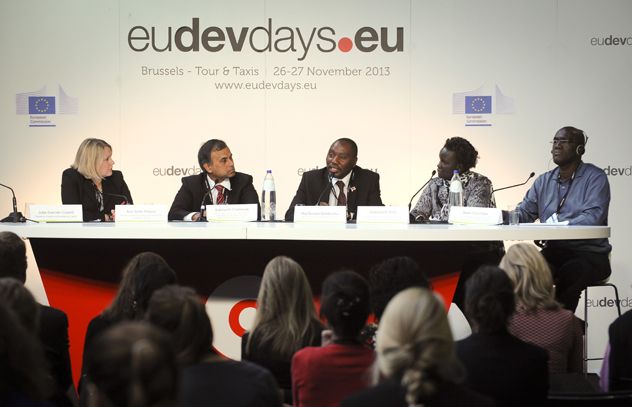
Consultation on the future of HIV, health and development held in Brussels.
Feature Story
Leveraging the transformative potential of the AIDS response as a force for social justice, equity and global health post-2015
04 December 2013
04 December 2013 04 December 2013A consultation on the future of HIV, health and development took place during the European Development Days held from 27-28 November in Brussels. The consultation was part of the regional dialogues series organized by The UNAIDS and Lancet Commission: Defeating AIDS – Advancing global health.
The main message emerging from the meeting was the need to leverage the experience of the AIDS response as a transformative force for social justice, equity and global health post-2015. Participants stressed the importance of putting marginalized and vulnerable communities at the centre of the HIV responses and integrate HIV, health and human rights in development responses after 2015.
Participants
Moderated by Member of the European Parliament Michael Cashman, the panel comprised Jacquelyne Alesi, Programmes Director, Network of Young People Living with HIV/AIDS in Uganda; Ann-Sofie Nilsson, Director-General for International Development Cooperation, Sweden; Siddharth Chatterjee, Chief Diplomat at the International Federation of the Red Cross and Red Crescent Societies; MacDonald Sembereka, Special Adviser to the President of Malawi and Baba Gumbala, International HIV/AIDS Alliance. The session was attended by members of parliament from Africa, European development actors, civil society, academics, government representatives and others.
Outcomes
The main issues discussed will be conveyed to the Chairs of the Commission’s three Working Groups, whose final papers will form the recommendation of the UNAIDS-Lancet Commission, to be published in The Lancet in 2014.
Quotes
"Youth represent the inter-generational nature of families – they connect to older generations and are a pathway to the future. Investing in young people is the sensible thing to do to ensure sustainable health outcomes."
"To reach zero, we need to change our attitude towards AIDS and people living with HIV. We must fight stigma and discrimination, ensure comprehensive sexuality education and guarantee the meaningful participation and involvement of young people and people living with HIV in all aspects of decision making."
"We need a more simple architecture which is focusing on health instead of diseases, but we also need to keep what works. The AIDS response has contributed significantly to the current architecture by including the human rights perspective on health, the strong engagement of civil society, the demand for accountability, and the multi-sectorial response."
"We, as donors and governments, multi-laterals, parliamentarians and civil society, need to make the case for AIDS, health and human rights to be prominently positioned in the post-2015 agenda. It is essential that we want to preserve and leverage the transformative force of the AIDS response and advance social justice and global health in the post-2015 agenda. It is a matter of life and death – and rights!"
"Ending AIDS can only be realized if governments take action to address the barriers of stigma and discrimination that prevent people from accessing the treatment and care they need."
Related

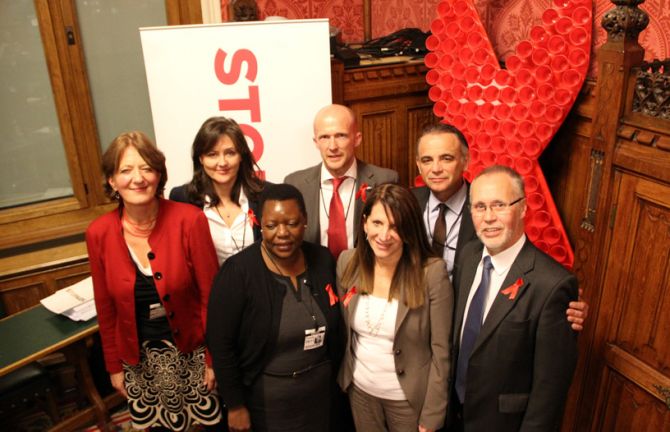
Marijke Wijnroks, Chief of Staff, Global Fund; Anne Aslett, Executive Director, Elton John Aids Foundation; Nik Hartley, Chief Executive Officer, Restless Development; Luiz Loures, Deputy Executive Director, Programme, UNAIDS; ‘Emma’, a national from Zimbabwe; Lynne Featherstone, Parliamentary Under Secretary of State of the UK Department for International Development; and Hon. Russell Brown MP, Vice Chair, All Party Parliamentary Group on HIV and AIDS. Credit: STOPAIDS
Feature Story
United Kingdom's Department for International Development announces a 50% increase in its annual contribution to UNAIDS
29 November 2013
29 November 2013 29 November 2013The United Kingdom's Department for International Development has announced a 50% increase in its annual contribution to UNAIDS, from £10 million to £15 million for 2013 and 2014. The announcement was made by Lynne Featherstone, UK Parliamentary Under-Secretary of State at an event on the UK’s International Response to AIDS. The event was co-organized by the All Party Parliamentary Group on HIV and AIDS and STOPAIDS to commemorate World AIDS Day.
Minister Featherstone emphasized the leadership of UNAIDS and its critical role in the global response to AIDS. She also stressed the need to continue efforts to prevent stigma and discrimination of all kinds.
Speaking at the event, UNAIDS Deputy Executive Director, Programme, Luiz Loures congratulated the UK on its commitment to the AIDS response and welcomed the UK's support and confidence in the work of UNAIDS. Dr Loures emphasized the need to ensure that no one is left behind in the response to HIV.
During the event, held in London in the House of Commons and chaired by Russell Brown MP, a review of the UK’s position paper on HIV in the developing world was launched followed by a discussion with Anne Aslett, CEO of the Elton John AIDS Foundation, Marijke Wijnroks, Chief of Staff at the Global Fund to Fight AIDS, TB and Malaria and Nik Hartley, CEO of Restless Development.
Quotes
"The UK government is committed to achieving the UN’s vision of zero new HIV infections; zero discrimination and zero AIDS-related deaths. Ensuring better integration of HIV within wider health systems, supporting key affected populations and making sure that women and girls are central to the HIV response are vital if we are to help people live longer healthier and more productive lives"
"Although the end of AIDS is in sight, it is not in sight for everybody, our job is to ensure that no one is left behind because he is a gay man or a migrant or an African child"

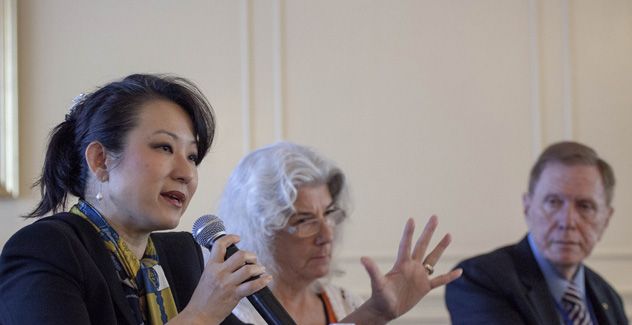
Lyn Kok, President and CEO of Standard Charter Bank (Thailand); Annmaree O’Keeffe from Lowy Institute; and Hon Justice Michael Kirby, Chair of the UN Commission of Inquiry on North Korea and Commissioner UNAIDS-Lancet Commission.
Feature Story
UNAIDS-Lancet Commission Asia-Pacific dialogue calls for renewed leadership
21 November 2013
21 November 2013 21 November 2013The second in a series of regional dialogues organized by the UNAIDS and Lancet Commission: Defeating AIDS - Advancing global health was held on 19 November in Bangkok. The need for a new approach to leadership on AIDS in the post-2015 era was the main message emerging from the dialogue.
The aim of the dialogue, which took place during the 11th International Congress on AIDS in Asia and the Pacific, was to gather regional perspectives on AIDS in the post-2015 agenda for inclusion in the work of the Commission.
Participants
UNAIDS Deputy Executive Director, Jan Beagle; James Chau, National UNAIDS Goodwill Ambassador for China; Hon Justice Michael Kirby, Chair of the UN Commission of Inquiry on North Korea and Commissioner UNAIDS-Lancet Commission; Dr Prasada Rao, United Nations Secretary-General’s Special Envoy for AIDS in Asia and the Pacific; Lyn Kok, President and CEO of Standard Charter Bank (Thailand) as well as parliamentarians, activists, people living with HIV, young people, corporate leaders, academia, and representatives of the UN system and other international organizations.
Key messages
- The need for a new approach to leadership on AIDS in the post-2015 era
- The importance of mobilizing broader partnerships, including with the private sector, to build on the momentum of the AIDS response.
- The need to build on lessons learnt in the response to HIV to strengthen the broader sustainable development agenda.
- Dignity, social justice and equity––essential to the post-2015 framework.
Outcomes
The outcomes of these dialogues will help inform the recommendations of the UNAIDS and Lancet Commission to be presented in 2014.
Additional regional, think tank and civil society dialogues are planned over the coming weeks: Civil society organizations in Eastern and Southern Africa (25 November); Europe (27 November), as part of the European Development Days; a think tank dialogue at the Institute of Global Governance, University College London (2 December); Caribbean (4 December); Latin America (4 December); Africa (7 December) and Eastern Europe-Central Asia (13 December). The first regional dialogue was held in Addis Ababa on 3 November.
Quotes
"We are at a pivotal time in the AIDS response. The Asia-Pacific region in particular is at a critical juncture. The region is making important progress towards reaching global AIDS targets, but the pace of progress is too slow and significant challenges remain. Business as usual will mean that the region will not meet the targets."
"We are not at Zero and there is a lot of getting to do… but in getting to zero we need to get AIDS back in people’s imagination – whether it resonates in their imagination in terms of the right to health and dignity or as a global public good; we need more action and fewer words."
"As we move into 2015 and beyond, it is imperative that the private sector and international advocacy organizations embark on a joint journey, playing to their unique skills, to keep AIDS on top of people’s mind. As not addressing the health impact, discrimination and stigma that exists will ultimately affect the productivity and economic strength of businesses and countries. Joining the call to 'Defeat AIDS and advance global health' is the responsible thing for businesses to do for their employees and society at large."
"The AIDS response has provided me an excellent platform to discuss transgender issues and has opened doors to a range of decision makers to address our issues. We need a strong AIDS response to continue to serve this function in the post-2015 period."

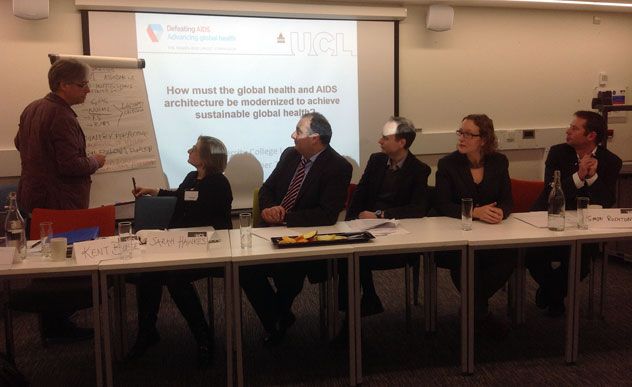
Participants of the Think Tank Dialogue hosted by the Institute of Global Governance and the Institute for Global Health at University College London (UCL).
Debrief
Think Tank Dialogue explores the future AIDS and global health architecture in a fast-changing world
10 December 2013
10 December 2013 10 December 2013The need for the future AIDS and global health architecture to be responsive to the needs of people across the world was the main outcome of the Think Tank Dialogue that took place on 2 December as part of the UNAIDS and Lancet Commission consultations. Participants also encourage the Commission to identify the incentives and levers available to transform the health architecture in a world where geo-political power is shifting.
Hosted by the Institute of Global Governance and the Institute for Global Health at University College London (UCL), the Dialogue was organized around three roundtable thematic sessions. Deliberations were informed by the ongoing work of the UNAIDS and Lancet Commission’s third Working Group on the AIDS and health architecture. The topics of the sessions were:
- Taking stock: Opportunities and lessons learnt from the AIDS response for global health governance
- Modernising the global heath and AIDS architecture: law, institutions, and public-private authority
- Pathways to enhancing coherence of the global health architecture
Participants
The dialogue was attended by officials from the Rockefeller Foundation, WHO, the Partnership for Maternal, Newborn & Child Health, DFID andThe Lancet, as well as leading academics, practitioners and civil society representatives in the field of global health. Presentations were given by Dr Kent Buse (UNAIDS), Dr Simon Rushton (University of Sheffield), Dr Helena Legido-Quigley (London School of Hygiene and Tropical Medicine), and Dr Sarah Hawkes (UCL).
Key messages
- Participants called for new approaches to address the emerging health burdens (including Non-Communicable Diseases) and the drivers of ill health—including the unhealthy lifestyles industries, as well as private health care providers.
- Concerted efforts should be made to ensure that the human right to health is realized and health inequality tackled.
- The global health architecture would benefit from the establishment of new independent accountability mechanisms which can undertake monitoring, review, and remedial activities
- The Commission was encouraged to identify the incentives and levers available to transform the architecture in a world where geo-political power is shifting, where Official Development Assistance (ODA) flows no longer exert a decisive influence, and where ideas play a more prominent role.
Outcomes
The outcome of the dialogue will inform the ongoing work of the UNAIDS and Lancet Commission’s third Working Group and a response document has been relayed to its Chair, Helen Clark, UNDP Administrator.
Quotes
Mapping out a way towards ending AIDS and, more broadly, universal health provision will require the kinds of rigorous diagnostics on display at this multi-stakeholder meeting. I am pleased that UCL has been able to enter into partnership with the UNAIDS and the Lancet Commission on these issues.
Poverty, inequality and the other major drivers of the emerging burdens of ill-health are global phenomena and we need a global health architecture that is equipped to deal with the determinants of ill-health as well as the provision of equitable and accessible health care.
It is crucial that priority is given to establishing an independent accountability arrangement within the global health architecture. The presence of an independent multi-sectoral body in the global health sector able and willing to hold stakeholders to account for their performance is long overdue.
The debate on future global health architecture exposes a range of perspectives, from denialists to defeatists, from pluralist to utopians…I think we need more pragmatists who can identify concrete, politically feasible, incremental steps to bring greater coherence, participation and independent accountability.








